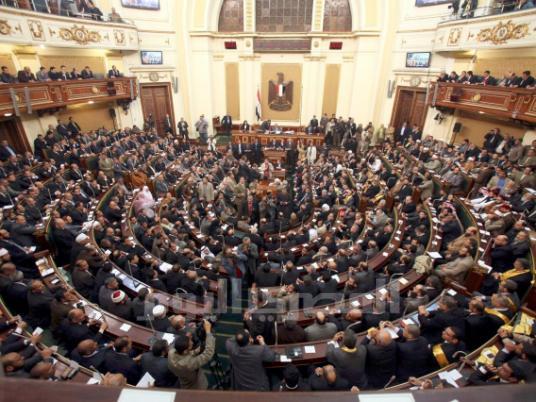
It’s hard to remember that just last Sunday, Parliament voted to withdraw confidence from the current government. Usually on such a week, nothing can top a move like that in terms of importance or focus.
However, this week in Parliament will be remembered for the security officer caught outside the building allegedly urging activists in a labor demonstration to scale the fence and attack the legislative body.
Now, like the rest of the country, MPs are trying to figure out what this officer, Ahmed Salah Eddin, was doing outside Parliament reportedly inciting protesters. According to the interior minister, who attended the parliamentary session to discuss the issue, he is an national security officer charged with securing the area around the Interior Ministry. The National Security Agency is now preoccupied with writing a report and questioning the officer.
MP Saad Aboud of the Nasserist Karama Party said he fears the disbanded state security apparatus is leading a counter-revolution. Many others in Parliament echoed this fear. They think the officer is part of a design to discredit any revolutionaries and protesters. Wasat Party MP Essam Sultan said Parliament must launch an immediate investigation into the issue to uncover the truth before the Interior Ministry attempts to confuse any fact-finding attempt.
Another drama erupted when Free Egyptians Party MP Mohamed al-Qurashi headbutted a journalist from the privately-owned Al-Shorouk newspaper for videotaping a labor protest outside of Parliament. The MP told the journalist, “You are setting the country on fire.” The incident prompted People's Assembly Speaker Saad al-Katatny to condemn the attack.
The opening sessions Sunday came on the heels of the contentious and disorienting sequence of events in the foreign NGOs trial, in which American suspects in the case were allowed to leave the country despite a previously imposed travel ban. Members of Parliament saw this is an opportunity to get back to their revolutionary and patriotic best. “Either we sack them or we resign, because that’s what the street wants,” screamed independent MP Mostafa al-Gindy, flailing his arms as his microphone was cut off mid-sentence.
MPs did, however, accurately reflect the general sense of confusion and anger following the shambolic handling of the case. As the defendants left the country, the judiciary, interim cabinet, and ruling military council all claimed to have nothing to do with the decision. Independent MP Amr Hamzawy argued in Parliament that implementing laws and looking after national security is the government’s responsibility.
The head of the Freedom and Justice Party's parliamentary bloc said Prime Minister Kamal al-Ganzouri’s refusal to show up for questioning with other cabinet members was “an insult” and that his government must go. Katatny said the US will not use its annual financial aid package to blackmail Egypt. Reform and Development Party MP Mohamed al-Sadat said what happened with the foreign funding case was “the insult of all insults.” Whoever was able to get some camera time that day made an emotive speech about the country’s sovereignty, and when it came time to vote, Parliament was filled with a sea of raised hands ready to change governments.
FJP MP Saber Abul Fotouh said one of two scenarios to remove the cabinet would entail confronting the Supreme Council of the Armed Forces, “which isn’t in the national interest.” Just a few days earlier, FJP MP Mohamed al-Beltagy reasoned that a vote of no-confidence would send a message to the SCAF that people do not want a government that receives orders from the military council.
In what could possibly be its first piece of legislation, Parliament approved an increase in compensation paid to families of protesters killed during the 25 January uprising against former President Hosni Mubarak. The increase in compensation would go from LE30,000 to LE100,000 for each family, according to a draft law under consideration.
In the specialized parliamentary committees, a multitude of issues were discussed.
The Foreign Affairs Committee is supposed to be looking into reshaping Egypt’s relationship with the US, which according to committee head Reda Fahmy should be based on “mutual respect.” To some, this mutual respect means ordering the extradition of Egyptians from US prisons, even if they are already convicted of crimes. Parliament voted to push the government to make that demand, with Omar Abdel Rahman, known as the Blind Sheikh, at the top of the list of prisoners to be returned. Abdel Rahman was convicted of conspiracy in a 1993 attempt to blow up the World Trade Center ― an attack that left six dead ― and sentenced to life in American prison.
The Arab Affairs Committee is looking into revisiting Egypt’s relationship with Israel, in light of last week’s Israeli bombing of the Gaza Strip, according to committee head Mohamed al-Saeed Idris. At the Monday evening session, MPs demanded the deportation of the Israeli ambassador and the withdrawal of the Egyptian ambassador from Tel Aviv.
In the Human Rights Committee, FJP MP Azza al-Garf condemned personal status laws, especially the child custody law and divorce law, as she said they violate Islamic Sharia. Garf said these laws are modeled after the West and harmful to family unity.
A foot and mouth disease outbreak in Egypt is reportedly affecting thousands of livestock. Egyptian Social Democratic Party MP Ayman Abul Ela said the issue must be viewed as an epidemic since it has spread to more than 22 governorates.
Nour Party MP Mohamed Heiba, who heads the Agriculture and Irrigation Committee, said his committee is looking for ways to compensate farmers affected by the outbreak, and seeking how the government and Agriculture Ministry can provide vaccines and inoculation serums more quickly.
The Economic Affairs Committee presented its latest coup, a trade agreement with Cambodia. A joint statement from the committee and the SCAF international affairs bureau read the entire agreement, which included easing the trade process between the two countries, as well as exchanging technical support.
The Health and Environmental Affairs Committee concluded that many ambulances were involved in transporting weapons and their workers acting as informants against revolutionaries at the beginning of the 25 January revolution. According to a report issued by the committee, first aid responders and paramedics were recruited by police during the 18 days.
MPs discussed the issue of potable water both in the general assembly and in the health committee. Akram al-Shaer, the head of the committee, reportedly dressed down the CEO of Damietta's controversial petrochemical plant, MOPCO, for failing to produce evidence that his company is fully compliant with waste regulations. MPs complained that a lack of adequate sewage treatment is also a major problem facing many governorates. Many do not have access to it, and even many of those who do suffer from its poor quality.
The committee also proposed the creation of a high commission on drugs that would monitor all pharmaceuticals in the country, in particular the production of generic drugs.
Next week promises more action. Egyptians may soon be faced with the Nour Party's version of corporal punishment, after many MPs voiced their support for Nour MP Adel Azzazy's proposal to immediately introduce new forms of physical punishment according to what he describes as Islamic law.
The Manpower Committee is to open discussions next week on many vital topics, such as discretionary spending on consultants and ministry contracts, syndicate rights, workers' rights abroad and other specific labor issues. FJP MP Ahmed Shehata had sent a request for information from the prime minister and local development minister on the appointment of ministerial advisers with high salaries. He pointed out that the state administrative apparatus includes 540,000 advisers earning annual wages that collectively total LE20 billion, which is out of the LE85 billion allocated to pay the 5.7 million employees working in the system.




